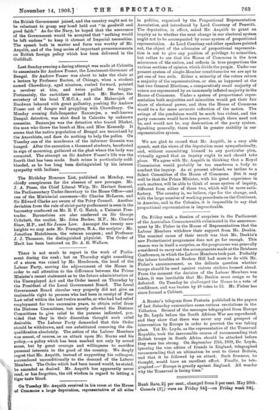There is not much to report in the work of
Parlia- ment during the week ; but on Thursday night something of a storm was raised by Mr. Henderson, the bead of the Labour Party, moving the adjournment of the House in order to call attention to the difference between the Prime Minister's recent statement as to the future administration of the Unemployed Act and the Order issued on Thursday by the President of the Local Government Board. The Local Government Board circular very properly did not give an inalienable right to persons who had been in receipt of Poor Law relief within the last twelve months, or who had had relief employment for two successive years, to obtain relief from the Distress Committees, but merely allowed the Distress Committees to give relief to the persons indicated, pro- vided that they in their discretion thought such relief desirable. The Labour Party demanded that this Order should be withdrawn, and one substituted removing the dis- qualification absolutely. The action of the Labour Members was meant, of course, as an attack upon Mr. Burns and his policy,—a policy which has been marked not only by sound sense, but by great courage and willingness to sacrifice personal interests to the good of the country. We deeply regret that Mr. Asquith, instead of supporting his colleague, surrendered unconditionally to the demand of the Labour Members. The Order which had been issued would, he stated, be amended as desired. Mr. Asquith has apparently never read, or has forgotten, the old wisdom in regard to letting a tiger taste blood.










































 Previous page
Previous page